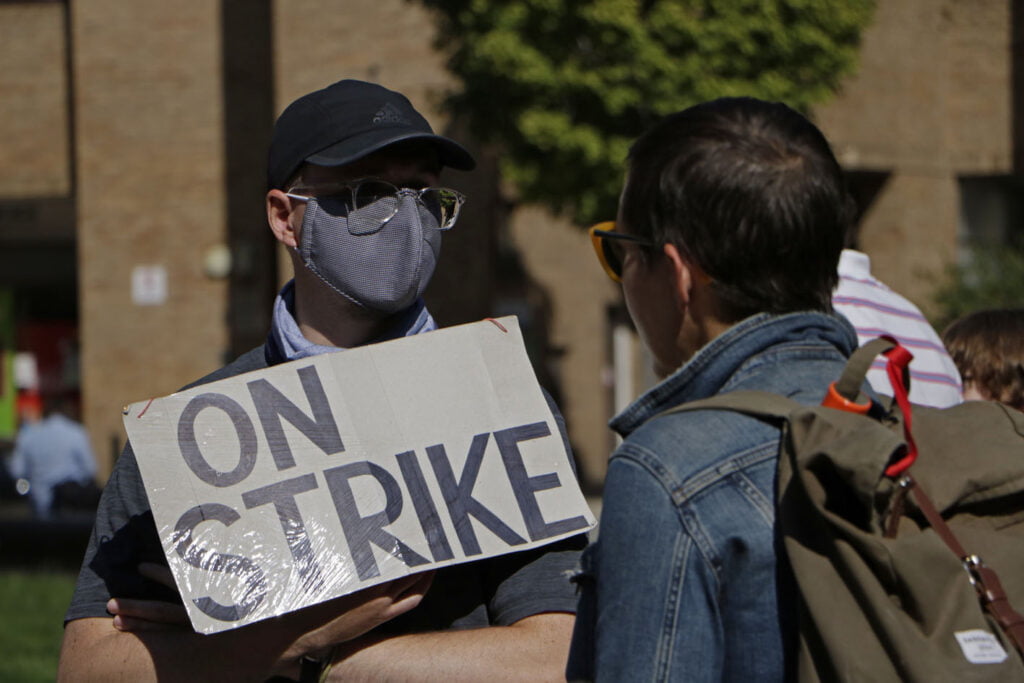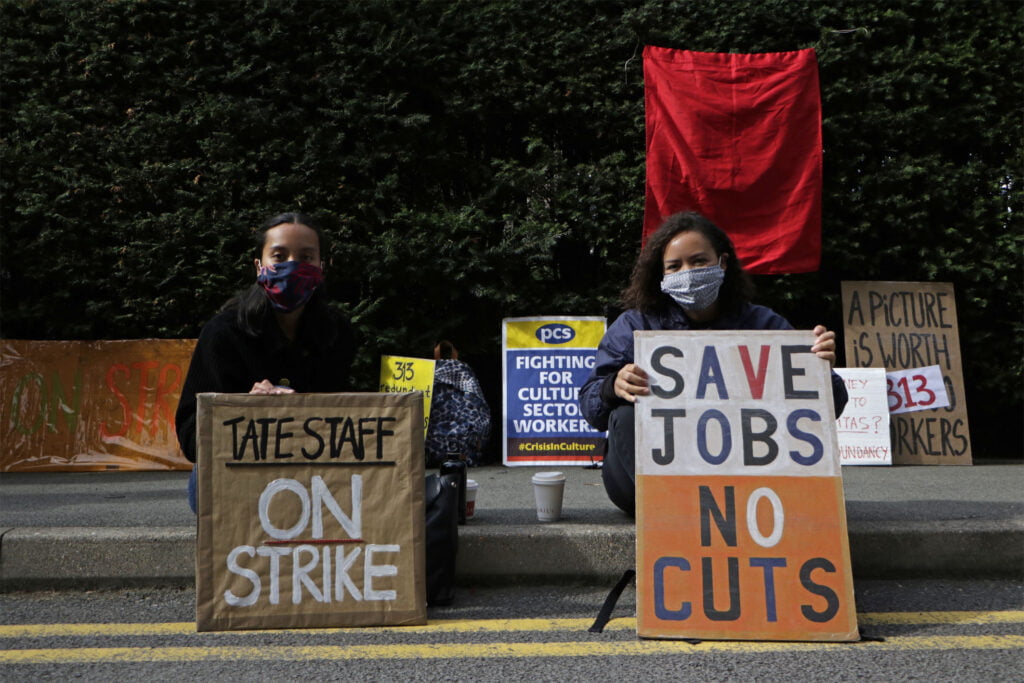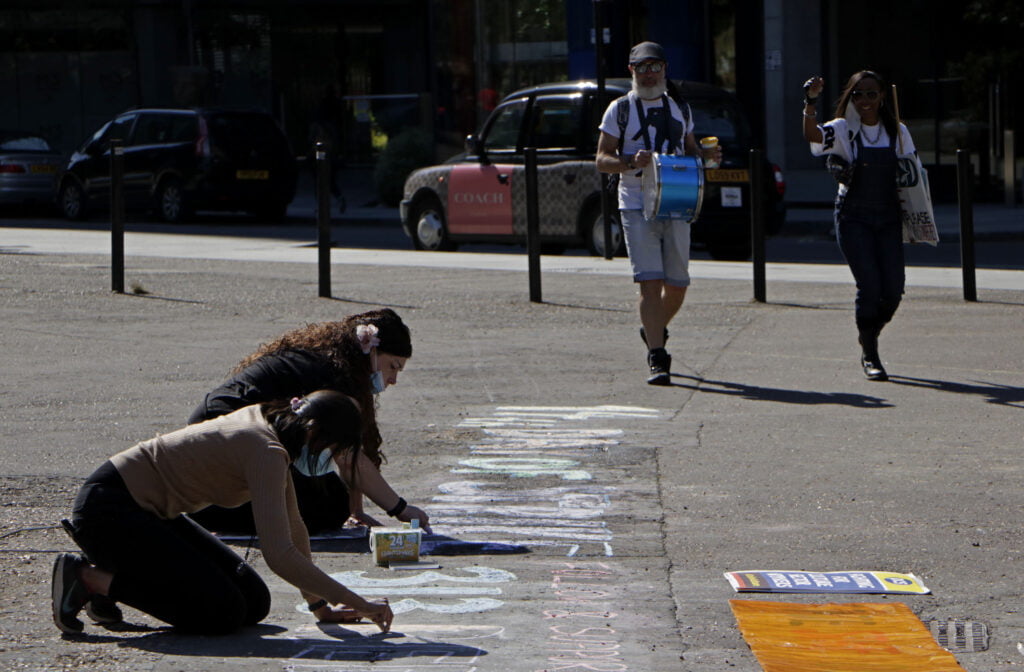
Credit: Tate United
So, if you haven’t already heard, there are currently picket lines outside Tate Modern and Tate Britain, sparked by the announcement that there would be over 300 redundancies across Tate Enterprises. Unsurprisingly, these cuts are predominantly affecting lower paid staff who work in the cafes, restaurants, and shops. This then has a disproportionate effect on BAME staff because while Tate (and they are not the only ones guilty of this) may claim to have a “diverse” workforce, in reality they mean that they have a lot of PoC staff in lower paid precarious roles, while their higher up staff are disproportionately white. They decided that now, in the middle of a pandemic, and a global wave of BLM protests, was a good time to make a large portion of their precarious/ BAME staff redundant. Nice one, Maria. Speaking of her, Tate’s official Instagram account took the time out to comment on The White Pube’s recent call out of them, informing us that the five directors at Tate have all taken a 10% pay cut from £185k down to a measly £166.5k – the poor things! Meanwhile they got a £7mil bail out from the government.
All of this then got me thinking, remember back in March when creatives were hopefully writing about how COVID-19 and lockdown could trigger a radical utopian shift in how galleries operate, becoming more accessible and putting more focus into community outreach? Then in June when they all put action statements out about Black Lives Matter, and how they would tackle racism in their institutions, and we thought they might actually stick to them? What happened there then? I think we maybe got a bit too hopeful and thought that the pandemic could dismantle centuries of capitalism and racism, and its effect on the art industry. If you were under the impression that big galleries cared more about their staff than their profits, or even more about their artworks than their profits, then now is the time to shatter that illusion.

Credit: Tate United
A radical shift in how galleries operate will never be led by the Tate, or any other big name institutions for that matter. That’s like expecting the Tories to bring in proportional representation. The current system works for them even if it fucks over everyone else, but why would they care about that? Don’t get me wrong, I’m not saying we should lose hope, I’m actually saying the opposite. We should still hold onto those utopian ideals of what the art world could look like, and what we want it to look like, but we should not expect it to happen in the bigger galleries – at least not for a long time. We should work towards these ideals ourselves, and look towards smaller community focussed spaces to lead the way.
These spaces are, for one, a lot more flexible and able to instigate change with more ease due to significantly less bureaucracy. On top of that, they actually want to, as the current system doesn’t work for them. Most smaller spaces are in fairly precarious positions, often renting their space from landlords who could boot them as soon as the area becomes more gentrified, and not having a large and valuable collection to rely on. These spaces rely on government, charity, and community funding, rather than being tied to big name private funders. Ultimately, bigger galleries are run by their funders and donors, as they have the power to withdraw their money or collections if the gallery does something they don’t agree with. These funders include people like the Sackler family aka the pharmaceutical giants responsible for the opioid crisis; Anthony D’Offay, the art dealer accused by multiple women of sexual harassment; and Poju Zabludowicz, founder of the Zabludowicz Collection and billionaire arms dealer who supplied Israel with weapons during the Israel-Gaza conflict. Do these people really sound like the ones who are going to be leading the art revolution?

Credit: Tate United
No, these are the people, the institutions, and the structures that we need to be fighting against. I’m interested to see what these bigger institutions will look like over the coming months as they all start to reopen, but I also know that despite them facing a predicted 80% decrease in visitor numbers, this will not be the end of them or the unethical structures they uphold. If a gallery has staff earning over £100k and still has unpaid interns and people on minimum wage, that is not an ethical business model, and they’re only going to get worse in the current recession. If you want new exciting, ethical, and accessible arts organisations then support the small ones. No, you won’t see a Picasso, or get to take a selfie in Yayoi Kusama’s ‘Infinity Mirror Room’, but you’ll be supporting smaller businesses and independent artists who could really do with your help right now. These places aren’t perfect, they don’t have tried and tested models of operating that are 100% ethical, but they care about the communities they are part of and the artists and workers that make up their teams.
Here is a by no means exhaustive list of some places to support instead of Tate and other big name galleries:
North West:
- The Royal Standard (full disclosure I do work there, but I promise I’m not biased)
- Output Gallery
- Dot-art
- CBS Gallery
- Convenience Gallery
- Arena
- Metal Liverpool
- Castlefield Gallery
- COLLAR
- Islington Mill
- Paradise Works
- Grundy Art Gallery
Nort East:
- NewBridge Project
- Serf
- Workplace
- Site Gallery
- Bloc Projects
- LeftLeg Gallery
- Vane Gallery
Scotland:
Midlands:
- Metal Peterborough
- Mansions of the Future
- Eastside Projects
- Grand Union
- Two Queens
South East:
- Metal Southend
- Flatlands
- Aspex
- K6 Gallery
- a space
- God’s House Tower
South West:
- Unit3
- The Island
- The Vestibules
- SPACE Bristol
- The Arts Mansion
- TOPOS
London:
- SPACE Ilford
- Black Tower Projects
- Deptford X
- DIY Space
Filed under: Politics
Tagged with: BAME, Diversity, enterprises, funding, gallery, pandemic, POC, redundancies, Tate, tate britain, Tate Modern, tate united



Comments